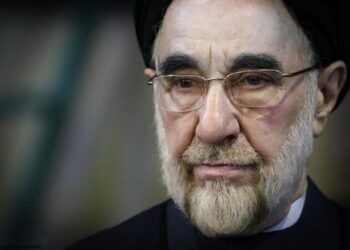It had been widely expected that the EU would remove Salehi from the sanctions list now that he is foreign minister. But the EU pointedly did not do so and Salehi remains ineligible to visit any of the 27 EU member states unless a special exception is made for him.
Such a sanction on a sitting foreign minister is extremely unusual and indicates the depth of disgust within the EU for the Islamic Republic. It has little practical value since, if the EU feels a need to talk to Salehi, the EU will issue an exemption. However, it does signal that the EU has no plans to deal with Salehi routinely and represents a harsh diplomatic slap in the face.
Salehi was sanctioned many months ago when he was head of the Atomic Energy Organization of Iran (AEOI). This week, the EU specifically voted to impose sanctions on Salehi again, merely updating the stated reasons for sanctioning him to include the fact that he is now foreign minister, a direct affront to make clear he wasn’t just on the list as an oversight.
Of the five individuals newly sanctioned, four are deputy chiefs of the AEOI and the fifth is the managing director of the Islamic Republic of Iran Shipping Lines (IRISL), Mohammad-Hossain Dajmar.
Of the 72 institutions newly sanctioned, Number One on the list is the Europaisch-Iranische Handelsbank (EIH) in Hamburg, which was set up before the revolution to promote Iran-German trade. It was cited for operating “a sanctions evasion scheme” and functioning “as a conduit for payments by sanctioned Iranian banks.” The British and French pushed hard to sanction the bank after it was revealed several weeks ago that it was being used by the Indian government to process payments for Indian purchases of Iranian crude.
News reports in Germany said the bank’s owners may shut it down since it cannot function under sanctions. The sanctions could have a major impact on Iran-German trade because the bank has been the chief payment mechanism used by small and medium size German businesses. Major firms doing major business in the United States have generally halted their Iran business so as not to run afoul of the Americans. Most German trade with Iran now involves small and medium sized firms that may not now be able to keep financial ties to Iran in the absence of the EIH bank.
The sanction list included one other Iranian bank, based in Belarus, 36 firms cited for involvement with Iran’s nuclear or military programs and 34 front companies tied to IRISL.
The list was very similar to the kinds of lists the US State Department issues every month or so as it tracks down yet another front created by the Islamic Republic to try to evade sanctions. The effort resembles a game of Whack-a-Mole in which western states slap down one front company only to find another pop up a few weeks later with a new name and address but the same activities.
The sanctions freeze a firm’s assets and bar EU firms from doing business with them.
In Washington last week, the Treasury Department issued two sanctions announcements involving Iran. Much press attention was given to the announcement that Treasury had sanctioned Iran’s Bank of Industry and Mines. Actually, that wasn’t accurate. The Bank of Industry and Mines was sanctioned by Washington long ago under one of the many US sanctions programs. Last week, it was sanctioned all over again under second and third sanctions programs for involvement in Iranian weapons of mass destruction programs and also under the Treasury’s Iranian Financial Sanctions Regulations. But the multiple citations don’t add to the impact.
More interesting was the fact that Treasury sanctioned a Pasdar general under Treasury’s Syria sanctions, pinpointing the officer for helping the Syrian government repress protests. Sanctioned was Mohsen Chizari, 52, identified as the chief of operations and training for the Qods Force of the Pasdaran.
The Qods Force is the Pasdar branch that handles operations outside Iran. US officials had previously said Iran was helping Syria by providing equipment, training and advice on how to crush opposition protests. Chizari is now pinpointed as the officer overseeing that.














